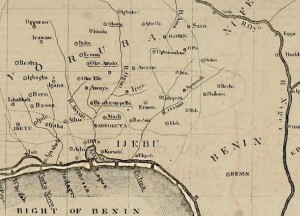
Ijaye; sub-group of Yoruba ethnicity, whose forebears migrated from the region around Old Oyo, which comprised the present-day Kwara State, to their present site in Abeokuta and Lagos. Ijaye of old Oyo was the base of Kurunmi, the famous Aare-Ona Kakanfo or Generalissimo of Yorubaland, who, despite his widely acknowledged military exploits against invading Fulanis from the North and many other Yoruba groups, eventually succumbed to the Ibadans, during the Ibadan-Ijaye war of 1860-1862. It was this defeat that led to the migration of many Ijayes to Abeokuta in Egbaland.
Old Town
Ijaye was an ancient military town in the northern fringe of the Egba forest in South West Nigeria that was ruthlessly destroyed by Ibadan in war. In its day, Ijaye was an important market town where Oyo traders exchanged slaves and clothes for food and European items from the coast brought by the Egba. Though originally a peaceful Egba Agura town, Ijaye became militarized when refugee soldiers encamped in Oke-Adan entered it in 1831 c. Kurunmi, after displacing a rival General, became the sole authority and enacted an autocratic rule in the town. Because of the high handedness of their lord, Ijaye, as attested by Bishop Vidal, a C.M.S. missionary visitor in 1855, was kept in excellent order. “A police is needless,’ he said, ‘for crime or depredation is hardly ever committed.”
Ijaye War
In the decade prior to the brief rise of the Ibadan Empire, Ijaye was a rival to Ibadan. Kurunmi nursed suspicion of Ibadan’s motives and was jealous of the leadership role it was taking among Yoruba towns. When in 1854 a peace accord supervised by Balogun Ibikunle of Ibadan was reached on behalf of all Yoruba territories, Kurunmi was disconcerted the hosting of a conference of such import had eluded his own town, Ijaye. Instead of pursuing the peace that was agreed should be the policy of Yoruba kingdoms, Ijaye began preparations for a war with Ibadan, which it believed, would avert the inevitable future that it would be sacked to complete Ibadan’s dominance.
Opportunity to confront Ibadan presented itself with the diplomacy of Ibadan towards Oyo, which reflected a change in paradigm. Also, Ijaye had been requested to give up parts of its land to the benefit of Oyo. Although Balogun Ibikunle tried to avert war, he assented to it to prevent a civil war at his own doorsteps. Ijaye saw the war between 1859 and 1862 that ended in it is complete annihilation. A large part of Ijaye population moved to Abeokuta and its former territory was annexed by Ibadan.





















